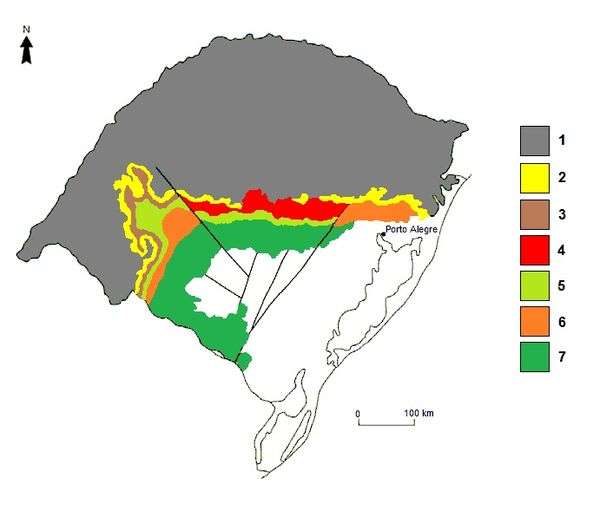Santa María Formation
| Santa María Formation Stratigraphic range: Middle to Late Triassic | |
|---|---|
|
Santa María Formation. Source: UFSM | |
| Type | Geological formation |
| Location | |
| Coordinates | 29°41′42″S 53°47′43″W / 29.695042°S 53.795403°WCoordinates: 29°41′42″S 53°47′43″W / 29.695042°S 53.795403°W |
| Region |
|
| Country |
|
|
Geopark of Paleorrota | |
The Santa María Formation is a sedimentary rock formation found in Rio Grande do Sul, Brazil. It has a late Ladinian – early Carnian age (Middle – Upper Triassic), and is notable for its fossils of early dinosaurs, including the herrerasaur Staurikosaurus, the basal saurischian Teyuwasu, and the basal sauropodomorph Saturnalia.[1] It received this name because it was discovered first in the city of Santa María.
The distinguished English paleontologist Arthur Smith Woodward determined the age of Santa María Formation dated Mesozoic Era, Upper Triassic period (about 220 million years).
The Santa María Formation is in the geopark of Paleorrota. [2] [3]
Fauna
Vertebrates
An unnamed prosauropod species is present in Rio Grande do Sul.[1]
| Vertebrates reported from the Santa Maria Formation | ||||||
|---|---|---|---|---|---|---|
| Genus | Species | Location | Stratigraphic position | Material | Notes | Images |
|
Rio Grande do Sul.[1] |
A synapsid. |
| ||||
|
C. barberenai[5] |
Rio Grande do Sul.[5] |
A partial mandible having some complete teeth.[5] |
||||
|
C. bonapartei[6] |
Rio Grande do Sul.[6] |
Disarticulated cranial and postcranial elements.[6] |
||||
|
P. barberenai[7] |
Rio Grande do Sul.[7] |
|
"ULBRA-PVT016, disarticulated partial skeleton... including most skull bones"[7] |
A basal sauropodomorph dinosaur. | ||
|
P. aurelioi[8] |
||||||
|
S. hopsoni[9] |
Rio Grande do Sul.[9] |
Cranial remains.[9] |
||||
|
S. tupinquim[1] |
Rio Grande do Sul.[1] |
|
A basal sauropodomorph dinosaur. | |||
|
S. absconditum[1] |
Rio Grande do Sul.[1] |
|
"Various postcranial remains."[11] |
Might not be dinosaurian.[1] | ||
|
S. pricei[1] |
Rio Grande do Sul.[1] |
|
"Partial postcranial skeleton with mandible."[11] |
A herrerasaurid dinosaur. | ||
|
T. barbarenai[1] |
Rio Grande do Sul.[1] |
|
"Right femur and tibia."[11] |
Might not be dinosaurian.[1] | ||
|
T. riograndensis |
A synapsid. | |||||
|
D. quartacolonia |
|
A pretosuchid. | ||||
Formations

Geological formations in Rio Grande do Sul:
1) Serra Geral Formation, Cretaceous.
2) Botucatu Formation, Cretaceous.
3) Guará Formation, Jurassic.
4) Santa Maria Formation e Caturrita Formation, Triassic.
5) Sanga do Cabral Formation, Triassic.
6) Piramboia Formation, Permian.
7) Itararé Group, Permian.
See also
References
- 1 2 3 4 5 6 7 8 9 10 11 12 13 14 15 16 17 Weishampel, David B; et al (2004). "Dinosaur distribution (Late Triassic, South America)." In: Weishampel, David B.; Dodson, Peter; and Osmólska, Halszka (eds.): The Dinosauria, 2nd, Berkeley: University of California Press. Pp. 527–528. ISBN 0-520-24209-2.
- ↑ Formação Santa Maria, (in Portuguese)
- ↑ Paleoformações, (in Portuguese)
- ↑ Romer, A. S. The Brazilian cynodont reptiles Belesodon and Chiniquodon. Breviora, 1969a, 332, 1–16. Online: Biodiversity Heritage Library
- 1 2 3 4 5 Téo Veiga De Oliveira, Cesar Leandro Schultz, Marina Bento Soares and Carlos Nunes Rodrigues (2011). "A new carnivorous cynodont (Synapsida, Therapsida) from the Brazilian Middle Triassic (Santa Maria Formation): Candelariodon barberenai gen. et sp. nov." (PDF). Zootaxa. 3027: 19–28. ISSN 1175-5334.
- 1 2 3 4 5 Tiago Raugust, Marcel Lacerda & Cesar Leandro Schultz (in press). "The first occurrence of Chanaresuchus bonapartei Romer 1971 (Archosauriformes, Proterochampsia) of the Middle Triassic of Brazil from the Santacruzodon Assemblage Zone, Santa Maria Formation (Paraná Basin)". In S.J. Nesbitt; J.B. Desojo & R.B. Irmis. Anatomy, phylogeny and palaeobiology of early archosaurs and their kin. The Geological Society of London. doi:10.1144/SP379.22. Check date values in:
|date=(help) - 1 2 3 4 5 Cabreira, Sergio F.; Cesar L. Schultz; Jonathas S. Bittencourt; Marina B. Soares; Daniel C. Fortier; Lúcio R. Silva; Max C. Langer (2011). "New stem-sauropodomorph (Dinosauria, Saurischia) from the Triassic of Brazil". Naturwissenschaften. 98 (12): 1035–1040. Bibcode:2011NW.....98.1035C. PMID 22083251. doi:10.1007/s00114-011-0858-0.
- 1 2 3 Lúcio Roberto-da-Silva, Julia B. Desojo, Sérgio F. Cabreira, Alex S. S. Aires, Rodrigo T. Müller, Cristian P. Pacheco and Sérgio Dias-da-Silva (2014). "A new aetosaur from the Upper Triassic of the Santa Maria Formation, southern Brazil". Zootaxa. 3764 (3): 240–278. doi:10.11646/zootaxa.3764.3.1.
- 1 2 3 4 5 F. Abdala & A. M. Ribeiro (2003). "A new traversodontid cynodont from the Santa Maria Formation (Ladinian-Carnian) of southern Brazil, with a phylogenetic analysis of Gondwanan traversodontids". Zoological Journal of the Linnean Society. 139 (4): 529–545. doi:10.1111/j.1096-3642.2003.00096.x.
- ↑ Langer, M.C., Abdala, F., Richter, M., and Benton, M. (1999). "A sauropodomorph dinosaur from the Upper Triassic (Carnian) of southern Brazil." Comptes Rendus de l'Académie des Sciences, 329: 511-;517.
- 1 2 3 4 5 6 "Table 2.1," in Weishampel, et al. (2004). Page 26.
- ↑ "Table 12.1," in Weishampel, et al. (2004). Page 235.
- ↑ Marco Aurélio G. França; Jorge Ferigolo; Max C. Langer (2011). "Associated skeletons of a new middle Triassic "Rauisuchia" from Brazil". Naturwissenschaften. 98 (5): 389–395. PMID 21445632. doi:10.1007/s00114-011-0782-3.
Bibliography
- Weishampel, David B.; Dodson, Peter; and Osmólska, Halszka (eds.): The Dinosauria, 2nd, Berkeley: University of California Press. 861 pp. ISBN 0-520-24209-2.
| Triassic Period | ||
|---|---|---|
| Lower/Early Triassic | Middle Triassic | Upper/Late Triassic |
| Induan |Olenekian | Anisian | Ladinian | Carnian | Norian Rhaetian |

